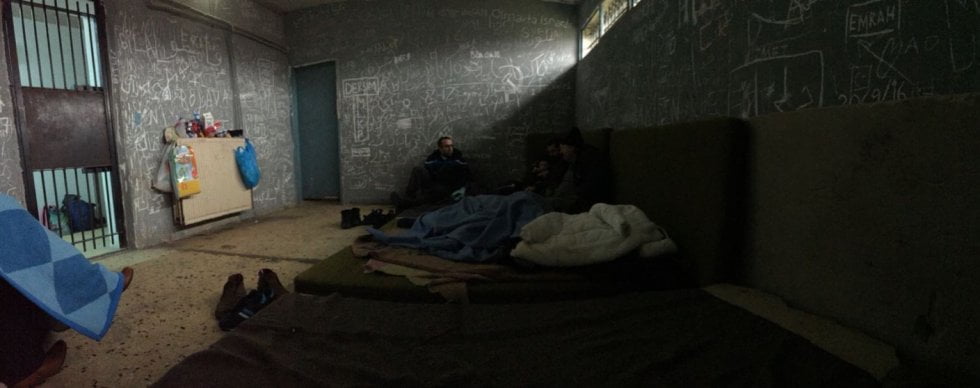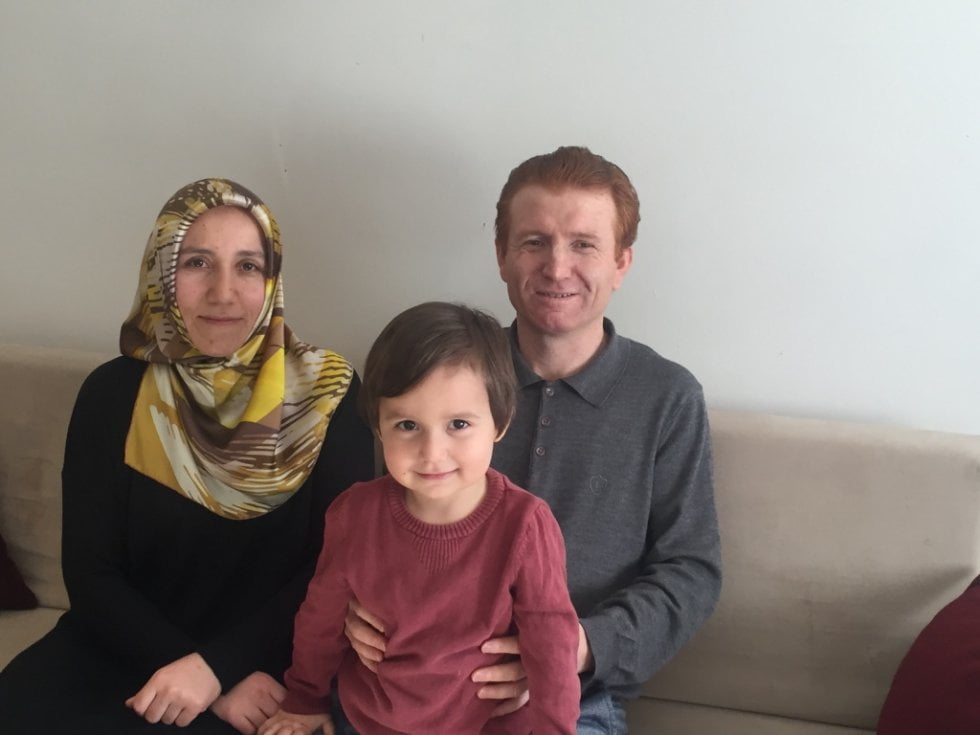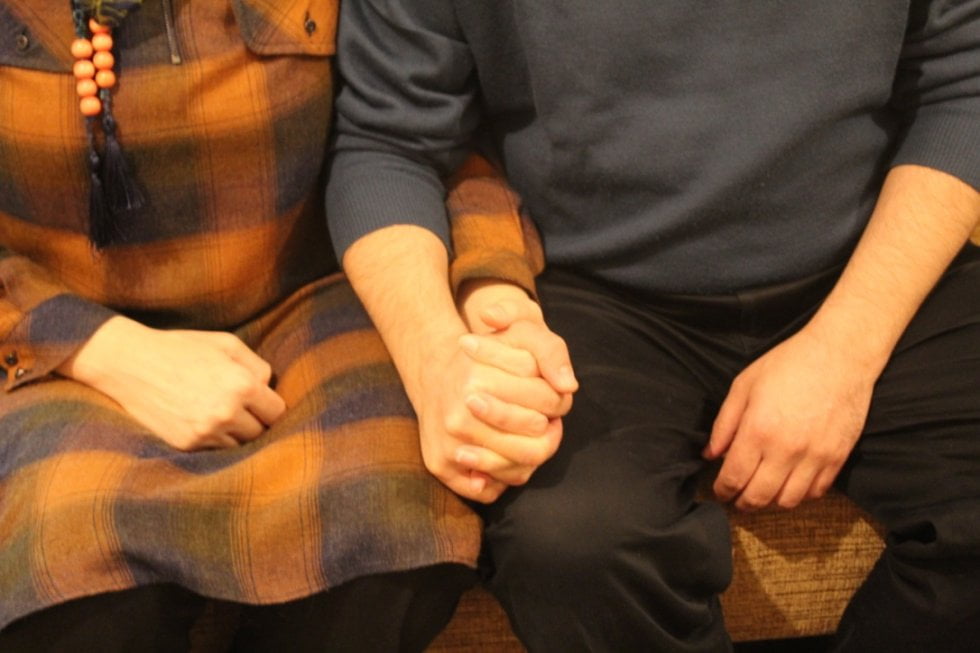Erdogan’s war on education: The exodus of Turkey’s teachers

Date posted: February 12, 2018
Isabelle Gerretsen
-
Turkish President Erdogan’s crackdown on dissent after coup attempt has led to an exodus of intellectuals.
-
Followers of Turkish preacher Fetullah Gülen and the Hizmet movement were the first to be targeted.
-
IBTimes UK travelled to Greece to meet the Turks who have been forced to flee to save themselves and their children.
More than 500 people have been arrested in Turkey in recent weeks for posting messages online which are critical of the country’s military offensive against Kurdish militia in Syria.
The arrests mark Turkish President Recep Tayyip Erdogan’s latest crackdown against free speech and dissent.
Since the failed coup attempt in July 2016, over 100,000 teachers, academics, civil servants and journalists have been arrested and imprisoned. Many of those detained are members of the Hizmet movement, which was founded by the Turkish preacher Fethullah Gülen.
Erdogan claims that Gülen, who lives in exile in the US, and his supporters were behind the coup attempt. But they deny any involvement and say that Erdogan used the coup to secure his grip on power and purge more than 150,000 educated Turkish civilians suspected of having ties to Gülen.
The crackdown has led to the closure of Gülen schools and removal of thousands of the preacher’s followers from state jobs, sparking a mass exodus of intellectuals from Turkey.
IBTimes UK travelled to Greece to meet dozens of Gülenists, teachers and academics who were forced to flee after their government launched a war on education.
They described the fear that dominated their lives after the coup attempt, as police raided their homes, arrested their relatives and friends, and seized their passports.
In search of safety and freedom, they made the treacherous crossing in small boats to Greece, placing their lives in the hands of smugglers.
In Greece, they are stuck in limbo. Without permanent residency, they are unable to find employment and support their families. As they try to rebuild their lives across the border, their traumatic experiences in Turkey continue to haunt them.
Following in the footsteps of Gülen
Academics with direct links to Gülen were the first to be targeted in the crackdown. Theologians who had spent time studying at the preacher’s home in Pennsylvania were rounded up and thrown in prison for their affiliation with Erdogan’s chief rival.
Some Gülenists were arrested in the months leading up to the coup attempt, sparking speculation that Erdogan plotted the purge before July 2016.
At a small apartment in Thessaloniki, northern Greece, Mustafa recalls how he received his first arrest warrant in February 2016, because of his affiliation with Hizmet.

Mustafa and Sema chose to flee Turkey after the coup attempt because they did not want their children to become orphans. (Picture: Isabelle Gerretsen)
He used to work as a theology teacher at a Hizmet school and had visited Gülen in Pennsylvania with a group of Islamic scholars.
“Hizmet is the only movement in Islam that works for everyone, for the whole of humanity,” he tells IBTimes UK. “Gülen advocates peace, not violence in Islam. His only weapon is the pen. I dedicate my life to his teaching.”
Mustafa’s devotion to Hizmet placed him on a terrorist list. Following his initial arrest, he had to go to the police station every other day to sign his name.
What is the Hizmet movement?
Hizmet is a global religious and social Islamic movement led by Turkish preacher Fethullah Gülen. ‘Hizmet’ means ‘service’ in Turkish and the movement advocates interfaith dialogue, democratic values and a tolerant version of Islam.
The movement, which does not have a formal structure, is believed to be the largest Muslim network in the world. Its influence extends far outside Turkey, with millions of followers worldwide and Gülen – affiliated schools, think tanks and media outlets found from Kenya to China. Hizmet has accumulated billions in revenue, as followers are said to donate between 5-20% of their income to affiliated groups.
Critics claim that the movement has political ambitions and is aiming to infiltrate the Turkish judiciary and military. They accuse Hizmet of having a “cultish hierarchy” and of being a “secretive Muslim sect.”
But members of the movement argue that Gülen’s teaching is not driven by a political ideology, but rather promotes working towards a common good for humanity.
After the coup attempt, police aggression against Mustafa escalated. Officers carried out several raids of his home and found 50 books written by Gülen, which they used as evidence to charge him with being the leader of a terrorist organisation.
Facing a life sentence, Mustafa decided to flee with his wife Sema and three young children. “We knew we might die in the process,” he says. “We chose to flee because we did not want our kids to become orphans.”
Their journey to Greece was traumatic, Mustafa says. The family walked for days to reach the coast, only to find that the boat they had paid for was not there. After several weeks spent hiding from police, a smuggler finally agreed to take them across to Rhodes in a speedboat.
His three children play ‘smuggler hide-and-seek’ with other refugee kids, Mustafa says sadly when asked about the impact the journey had on them.
When the family arrived in Athens in September 2016, they were told they were the first Turks to seek asylum since the coup.
Over a year after they arrived in Greece, life remains hard for Mustafa and his family. They have to make ends meet with €450 they are given by the UNHCR each month, which barely covers rent.
We chose to flee because we did not want our kids to become orphans.
The children are in Greek schools and have made friends, but Mustafa and Sema are unable to work because they do not have permanent residency.
Despite the hardship they have endured, Mustafa says he has no regrets about his past life in Turkey. “We lost everything but we are not sorry for it. We would do the same again and follow in Gülen’s footsteps.”
Branded a terrorist
Selim* and his wife Meryem* were also targeted because of their ties to Gülen. Selim spent time studying at the preacher’s home in Poconos while completing his PHD in Islamic Studies.
“I spent my life with books and that is why they wanted to arrest me,” he says as his three sons race around the family’s apartment in Thessaloniki.
Selim was branded a terrorist because of his connection with Gülen and placed on a state terror list.
After the coup, he went into hiding. He did not see his children for three months. Meryem would wear a burka when she came to visit, to conceal her identity from the police. She moved house several times and at each new address officers would turn up and harass her about Selim’s location. She still has nightmares about police officers chasing her.
I spent my life with books and that is why they wanted to arrest me.
Selim says that he has a pituitary gland disorder which requires him to take hormone supplements. While in hiding, he started to feel very unwell but he was afraid to get medical treatment.
“I knew that if I went to hospital they would arrest me,” he says.
Bylock and Bank Asya
Thousands of people have been arrested for using the encrypted mobile app Bylock since July 2016, with police claiming that the mobile app was used to facilitate planning for the coup attempt.
Having an account with Bank Asya, which was founded by Gülenists, is another common reason for arrest and is used as evidence that the person is a member of Fethullah Gulen Terrorist Organization (FETO), the Turkish government’s rebranding of the Hizmet movement.
Several Turkish refugees IBTimes UK spoke to were arrested because they were caught using Bylock or had a Bank Asya account.
“If they had taken him into custody, he would not have survived more than a week,” Meryem says. She has heard countless stories of people not being given their medication while in detention.
Meryem lost her job as a religious teacher at a state institution several months after her husband’s name appeared on the terrorist list.
“I was a very good employee and my hard work was rewarded with promotion,” she says. “Then I was suddenly fired because of my husband’s position, even though they could not find anything against me.” Her brother is in jail because the encrypted messaging app Bylock was found on his phone.
“I feel guilty that I could not save him,” Meryem says.
Selim’s family is one of only four to have received permanent residency in Thessaloniki. There are over one hundred families living in the city and more than double that in Athens.
Selim and Meryem are determined to rebuild their lives, but say the injustice of their situation is hard to move past.
“I lost everything: my students, my family, friends and PHD,” says Selim. “If you have done a crime you have to accept it. But how can we? We did nothing wrong.”
A prisoner in one’s own home
“Erdogan does not care about education. He fires a hundred teachers a day,” Hakan* tells IBTimes UK at an Airbnb in Athens where he is living with his daughter and wife.
He and his wife Elif* both lost their jobs as teachers following the coup. Their bank account was frozen and they were placed on the state terror list.

Selim* was targeted in Erdogan’s crackdown because of his ties to Gülen. He and his wife Meryem* now live in Thessaloniki and recently received permanent residency. (Picture: Isabelle Gerretsen)
Shortly after that, the raids started. “Every day during morning prayer they came and searched the house,” Elif recalls. “Every morning I was looking out of the window, waiting from them to arrive.
“They were looking at our books, whether the publishers were associated with Gülen. They didn’t find anything.”
Their 10-year-old daughter Zehra* attended a renowned Gülen school. Hakan and Elif burned all her school certificates and medals because they were afraid the police would use them as a reason to arrest the entire family.
After an arrest warrant was issued for Hakan, he went into hiding. He spent six months living in a derelict building and chose to have little contact with his wife and daughter as he knew police were watching them.
Zehra breaks down in tears as she recalls their separation. “I thought my father was away for work. I missed him so much. Every day I went into his bedroom and hugged his clothes so that I could smell him.”
When Hakan’s uncle threatened to reveal his hiding place to the police, he decided to pull his daughter out of school and move his family to a secret location. They did not leave the house for months because they feared that a neighbour would notify the police. A friend came once a day with food.
Elif says this period was “psychologically destroying” the three of them. They felt like prisoners trapped in their own home.
“Gülen teaches us to open our hearts and talk to our neighbours. But after the coup we closed our doors and did not talk to anyone. This was very difficult for us,” she says.
“Zehra would look through the window at the school next door, while she was locked inside. It was destroying her,” Hakan says. “This is when we decided to leave the country.”
“Gülen teaches us to open our hearts and talk to our neighbours. But after the coup we closed our doors and did not talk to anyone.
Their journey was incredibly distressing, Hakan says. They crossed the river near a military base where they knew a general resided who offered smugglers double if they handed over Gülenists. They had to spend a night hiding in the bushes by the base as they waited for the boat to arrive.
When they arrived on the Greek side, they were chased by wild dogs, an experience which has traumatised Zehra, her father says.
They were happy when Greek police caught them. “They treated us very well,” Hakan says. “Zehra told us she felt safer spending [several nights] in jail than [she did] in Turkey. She said: ‘The Greek police are keeping us safe from the Turks.'”
A foreign country where there are no job opportunities offers more hope and security for these refugees than life in Turkey.
A Turkish journalist who now lives in Thessaloniki succinctly sums up what so many refugees are feeling: “We felt safer when we were detained in terrible conditions in a Greek prison, than we did when we were free in our own country.”
*Names have been changed to protect the identities of the refugees.
Source: International Business Times , February 12, 2018
Tags: Education | Greece | Persecution of Hizmet by Erdogan | Turkey | Turkish Asylum Seekers |
























